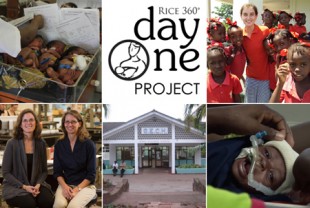UNICEF report features Rice’s ‘Nursery of the Future’
Initiative to save premature newborns gets boost at UN children’s event
Rice University’s ambitious “Nursery of the Future” project is getting a global boost from UNICEF’s influential annual report, The State of the World’s Children 2015, which will be unveiled today at the United Nations.
The new report highlights innovative technologies that are improving children’s lives. It includes a chapter dedicated to the Nursery of the Future, a multi-institutional initiative by Rice, the University of Malawi College of Medicine and Queen Elizabeth Central Hospital in Blantyre, Malawi, to create affordable technologies that can save the lives of millions of newborn babies each year.

Maria Oden (left) and Rebecca Richards-Kortum at Rice University's Oshman Engineering Design Kitchen in Houston. Credit: Jeff Fitlow/Rice University
“Deaths in the first month of life still comprise more than 40 percent of all deaths for children under the age of 5,” said Rice’s Rebecca Richards-Kortum, an award-winning innovator and bioengineer who also directs Rice 360°: Institute for Global Health Technologies. “The technology exists to save many of these babies, but it must be reimagined, redesigned and packaged for use in low-resource hospitals.”
UNICEF’s flagship publication, The State of the World’s Children, each year examines a key issue that affects children. The 2015 report focuses on the power of innovation to improve children’s lives.
A chapter of the report written by Richards-Kortum and co-authors Maria Oden and Dr. Elizabeth Molyneux explains that the majority of neonatal illnesses in low-resource settings could be addressed with a suite of technologies that provide:
- adequate hydration and nutrition.
- prevention and treatment of infections.
- temperature stability.
- breathing support.
- jaundice treatment.
The authors go on to list 18 low-cost technologies for essential newborn care — collectively dubbed the Nursery of the Future — that hospitals need most to address the five treatment areas.
Several of the technologies, including two award-winning respiratory support systems, have already been invented by teams of Rice University students mentored by Richards-Kortum and Oden, the founders of Rice’s award-winning, hands-on engineering design and education program Beyond Traditional Borders. BTB sends several Rice students to Queen Elizabeth Central Hospital each summer to test their designs under the supervision of Molyneux and other pediatric specialists.

Rice University is partnering with the University of Malawi College of Medicine and Queen Elizabeth Central Hospital in Blantyre, Malawi, on the design and clinical testing of a suite of newborn health care technologies for the Nursery of the Future. Ultimately, the partners hope to deliver a suite of neonatal technologies that a regional hospital could implement for less than $10,000.
A 2014 clinical study conducted at the hospital found that a $400 student-designed breathing system called Pumani — a redesigned version of the $6,000 continuous positive airway pressure (CPAP) systems used in most developed-world neonatal units — increased the survival rate of newborns with severe respiratory illness from 44 percent to 71 percent. Pumani is now in use at all government hospitals in Malawi, and GlaxoSmithKline and London-based Save the Children committed $400,000 in 2013 to expand its use to Tanzania, Zambia and South Africa.
Also in 2013, Richards-Kortum, Oden and Molyneux founded the Day One Project to build an innovation facility at the hospital where other technologies for the Nursery of the Future could undergo clinical study.
Among the next projects slated for clinical study are Autosyp, a user-friendly device that simplifies the delivery of intravenous medication and requires no electricity, and BreathAlert, an apnea monitor for premature babies. The second device, which was invented by Rice students in 2012, won a Grand Challenges grant in August from the U.S. Agency for International Development, the government of Norway, the Bill & Melinda Gates Foundation, Grand Challenges Canada and the United Kingdom’s Department for International Development.
“Based on technologies that are available or under development, we estimate that a complete Nursery of the Future for a district hospital serving … 300,000 people could be installed for $5,000 to $10,000, much less than the cost of one western-style ventilator,” Richards-Kortum, Oden and Molyneux wrote in The State of the World’s Children 2015.
Richards-Kortum is the Stanley C. Moore Professor of Bioengineering and of electrical and computer engineering at Rice. Oden is professor in the practice of engineering education at Rice and director of Rice’s Oshman Engineering Design Kitchen. Molyneux is honorary professor of pediatrics at the University of Malawi College of Medicine and chief of pediatrics at Queen Elizabeth Central Hospital, which admits approximately 25,000 children per year.


Leave a Reply